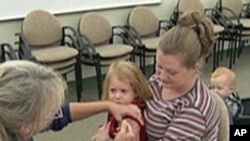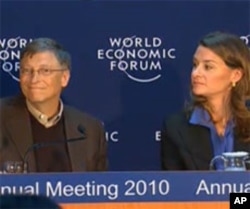Announcement of a $10-billion, ten-year research commitment by the Bill and Melinda Gates Foundation for vaccines against pneumonia and pneumococcal diseases is expected to save the lives of nearly 1.6 million children every year. The initiative, unveiled last Friday at the World Economic Forum in Davos, Switzerland, continues to be hailed at this week’s World Health Organization (WHO) Global Immunization Meeting in Geneva, according to Dr. Orin Levine, the executive director of the International Vaccine Access Center at Baltimore’s Johns Hopkins University (IVAC).
“The immunization world was galvanized ten years ago by the Gates announcement in Davos, and we are re-galvanized by this decade of vaccines, a decade that we hope is really the first decade of a century of vaccines. And it has just completely energized the immunization community here in Geneva,” said Dr. Levine.
He says that immunization against the world’s leading killer of children under age five is considered a priority in developing countries, where limited access to effective inoculation has left more than 800,000 children defenseless against infections that, when compounded by HIV/AIDS, most often can mean death.
“The Gates Foundation commitment is going to be a huge boost to vaccine development and delivery for life-saving vaccines for children all over the world. I think the realistic expectation is that it’s going to save millions of children’s lives over the next ten years,” he predicted.
Dr. Levine points out that the most vulnerable children in Africa, Asia, and other parts of the developing world have lacked access to quality care to shield them from high risk factors like HIV and malnutrition. He says African governments are keenly committed to expanding widespread use of vaccines currently on the market and those under development.
In 2006, Rwanda became the first African country to introduce pneumococcal conjugate vaccines (PCVs) in a nationwide campaign. The Gambia followed Rwanda’s lead, and ten or more countries are expected soon also to embrace the initiative, including Kenya, the Democratic Republic of Congo, Cameroon, Sierra Leone, Mali, and the Central African Republic. Dr. Levine says they’ll have an amply assortment of proven medications to rely on.
“There are three licensed vaccines from two manufacturers. The vaccine manufacturer Wyeth, which now becomes Pfizer, came out with the first vaccine, which had seven important serotypes and has now developed a formulation that has 13 serotypes. And Glaxo-Smith-Kline has a vaccine that has ten important serotypes and an important cause of pneumonia and ear infections called Haemophilus influenza. Those vaccines are increasingly getting used and should provide widespread protection around the globe,” he noted.
With new commitment from the Gates Foundation and a cooperating enlistment of resources from drug manufacturers, donor countries, and developing nations, Dr. Levine says facilitators hope that enough vaccines will be affordable and within reach of thousands of new patients in countries where the neediest children live.
“It’s really important that vaccine manufacturers do their part in this whole system. We count on them to develop the newest, safest, most effective life-saving vaccines. And then, when they’re discovered, when they’re licensed, to make sure that there’s sufficient supply to be able to provide those vaccines to every child in the world. We’re hoping that they see the commitment by the Gates Foundation to financing these vaccines as another indication that they should be making the development and manufacturing of those vaccines a significant priority,” he said.
Coordination of the Bill and Melinda Gates Foundation’s pneumoccal vaccine initiative stems from the Global Alliance for Vaccines and Immunization (GAVI), which is based in Geneva. The Johns Hopkins International Vaccine Access Center works with GAVI and the Gates Foundation, UNICEF, and the World Health Organization to encourage governments to pursue policies that support making vaccines more readily available and to build a political will to make implementation of those policies a reality.






